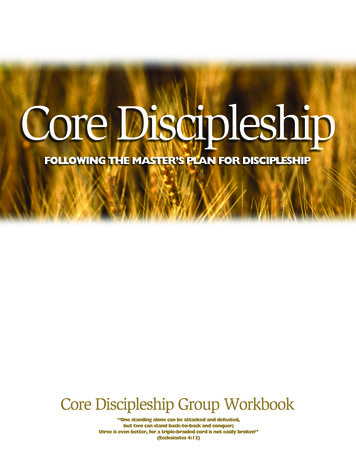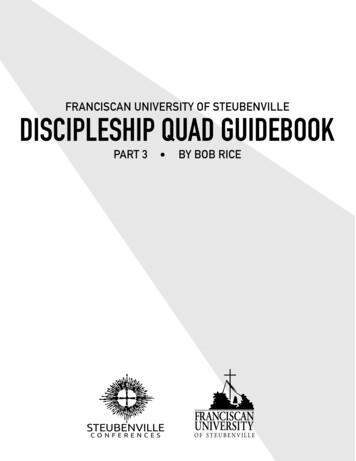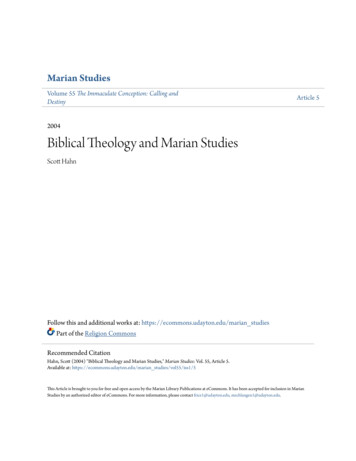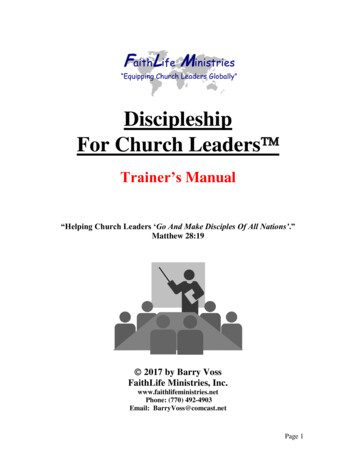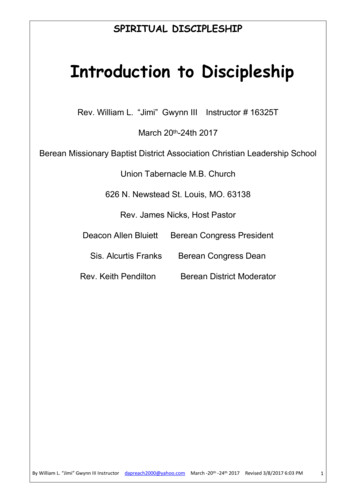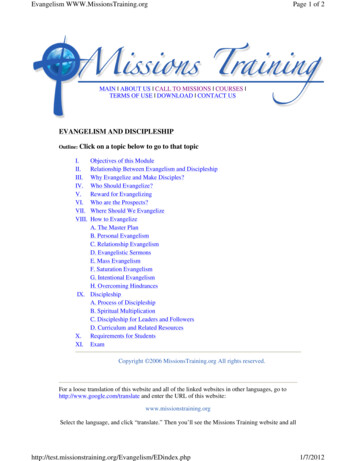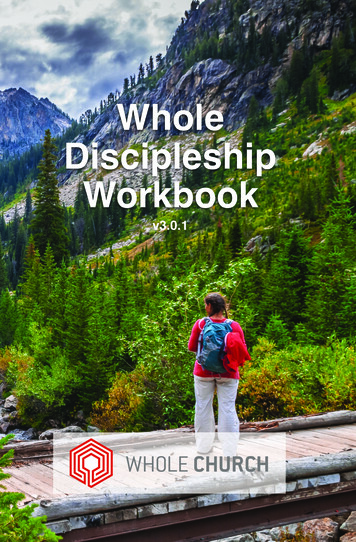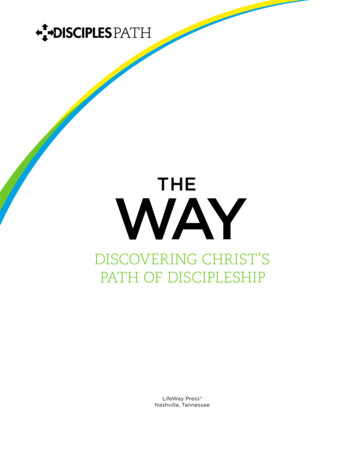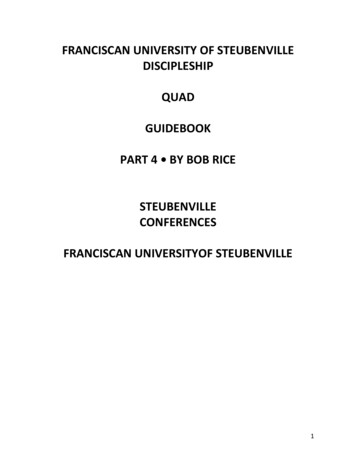
Transcription
FRANCISCAN UNIVERSITY OF STEUBENVILLEDISCIPLESHIPQUADGUIDEBOOKPART 4 BY BOB RICESTEUBENVILLECONFERENCESFRANCISCAN UNIVERSITYOF STEUBENVILLE1
About the Discipleship Quad GuidebookIn developing Discipleship Quads, Franciscan University of Steubenville saw aneed for a Catholic discipleship curriculum that was specifically written for theDiscipleship Quad process, and therefore created the Discipleship QuadGuidebook. Dr. Bob Rice, professor of Catechetics and director of the Masters of Arts inCatechetics and Evangelization at Franciscan University of Steubenville, is the primary writer.The Guidebook is also the fruit of the feedback and consultation of many people who workin the field of discipleship, including the Catechetical Institute at FranciscanUniversity. This resource is available for free to download on steubenvilleconferences.com andprovides all that is needed to conduct Discipleship Quad gatherings. It guides a person throughthe various aspects of being a disciple of Jesus in the Catholic Church today, giving specificattention to not only gaining knowledge about being a disciple, but by challenging each personto actually grow into the disciple God created him or her to be, which includes actively sharingthe faith and making other disciples. The Discipleship Quad materials, including all support documents and content, is copyrightedby Bob Rice and Franciscan University of Steubenville, 2019. None of it may be reproduced inwhole or in part in any manner, for sale or use outside of its intent, without the permission ofthe copyright owners. Copies can be made for distribution and use by Discipleship Quadparticipants.2
Table of ContentsCharacteristics of a Disciple (Self-Assessment 3): Week 33 Lesson Self-Assessment 3:Discipleship Quad Gathering OutlineThe Spiritual Battle: Week 34 LessonGoing Deeper: Questions about the DevilThe Spiritual Battle: Discipleship Quad Gathering Outline Receiving Mercy, Sharing Mercy:Week 35 LessonReceiving Mercy, Sharing Mercy: Discipleship Quad Gathering Outline Rotation ofFacilitation4Full, Conscious, and Active Participation: Week 36 Lesson27Full, Conscious, and Active Participation: Discipleship Quad GatheringOutline Take up Your Cross: Week 37 Lesson33919Discipleship in Action: FastingTake up Your Cross: Discipleship Quad GatheringOutline Upon This Rock: Week 38 LessonUpon This Rock: Discipleship Quad GatheringOutline Body and Soul: Week 39 LessonBody and Soul: Discipleship Quad GatheringOutline Discerning God’s Will: Week 40 Lesson394553Going Deeper: Modes of Discernment“Here I Am, Send Me!”: Discipleship Quad GatheringOutline The Call to Discipleship: Week 43 LessonDiscipleship in Action: Starting a New Quad Characteristics of a Disciple57(Self-Assessment 4)The Call to Discipleship: Discipleship Quad Gathering Outline3
WEEK 33Characteristics of a Disciple Self-Assessment 3It was about 10 weeks ago that you completed the second Characteristics of a Disciple SelfAssessment as a personal reflection. You were given a brief amount of time to discuss this withyour Discipleship Quad the following week. This third Self-Assessment is the entire content forthe week (rather than in addition to another lesson). Therefore, this week, the DiscipleshipQuad preparation is a bit different from previous weeks’, as you will discuss the characteristicsof a disciple for a third time and have an opportunity to evaluate where you are on the journeyof discipleship at this point. Your goal this week is to read through the characteristics of adisciple, referencing your answers from Week 13 and Week 22 in order to see your growth.Consider how you have grown and what further commitments you want to make in the areas ofthese characteristics. Remember, these Self-Assessments are here to help you toidentify how you can work toward growth in each of these areas in your daily life and allow youthe opportunity to make a practical goal for each one. Here is the description of a disciple weare using for the Discipleship Quad program: A disciple is a person who has responded to God’sgrace of conversion, is committed to living a life of faith as taught to us by Jesus, and is furthercommitted to sharing their life of faith with others so as to equip them to go and make otherdisciples. Therefore, we have identified the following core characteristics of being a disciple ofJesus:A disciple of Jesus Christ 1. Is rooted in the identity of being a son/daughter of God2. Has an active, daily prayer life3. Regularly receives the sacraments4. Is in fellowship with other disciples5. Devotes his or her time to serving others6. Shares the Gospel with those around him or her7. Is obedient to what the Church teachesRead the following descriptions of each characteristic and answer the questions.Is rooted in the identity of being a son/daughter of GodWe receive our identity as a son or daughter of God in our baptism. This iswhat roots us in the truth of God’s personal love for us as his children. We areloved because we are his, not because of what we do or how we act. Thistruth builds the foundation for making major life decisions, our vocation, andliving our God-given purpose every day.How have you grown in your identity being rooted in being loved by God and not in what youdo?What is your next step to grow in your identity as a son or daughter of God?Has an active, daily prayer life4
A disciple builds his or her relationship with the Father, Son, and Holy Spiritby regularly communicating with him in prayer. This includes daily personalprayer time, prayers of petition, praying with others, and traditionaldevotional prayers.How have you grown in your prayer life?What is your next step to grow in prayer?Regularly receives the sacramentsThe sacraments of the Catholic Church give the disciple the grace to live theChristian life. A disciple makes frequent use of the sacraments and depends onthe grace of a sacramental life. This includes all seven sacraments, withemphasis on the Eucharist and Reconciliation.How have you grown in living a sacramental life?How are you doing with attending Sunday Mass?How has your experience of attending Mass changed or been transformed?When was the last time you went to the Sacrament of Reconciliation?Considering your answers above, what is your next step to grow in the sacramental life?Is in fellowship with other disciplesThe journey of a disciple is a journey that is intended to be done in communityand fellowship with others. We are not meant to live the Christian life alone.This not only means being surrounded by others in a faith community, but alsohaving frequent fellowship with a few close friends to help one another grow ina trusted and authentic friendship where Jesus is the foundation and thereis a mutual desire to help each other grow as disciples. The Discipleship Quadis intended to be a formative experience in fellowship. The fruits of meetingweekly with three others for intentional fellowship is transformative and canvery much meet the need for Christian fellowship and community.How have you grown in experiencing Christian fellowship and community?Considering the commitment to this Discipleship Quad is a commitment to grow in fellowship,what isyour next step to grow in cultivating frequent time in genuine Christian fellowship outside thisQuad?Devotes his or her time to serving others5
By following the example of Jesus, a disciple is called to serve those in need.This is done in the Church community by giving of our time, talent, andtreasure—especially to those who are poor and in need.How have you grown in serving the Church and those in need through your time, talents, andtreasure?Keep in mind your service to your family and remember that our ministry needs to start in ourhomes.What is your next step to grow in service to others (including your family)?Shares the Gospel with those around him or herThe good news of the Gospel message of our salvation compels us to share itwith others. As a disciple, we are called to share the Gospel by proclaimingGod’s love in our everyday lives through our actions and words.How have you grown in comfort with sharing the Gospel (the Good News about Jesus) withpeople youencounter in your life? How have you shared the Good News?What is your next step to grow in sharing the Gospel?Obedient to what the Church teachesGod has given us all we need to live in the truth of his love through what theChurch has passed down through tradition and Scripture. We are called to beobedient to these truths because God knows that it will lead us to fullness oflife. The first step to being obedient is knowing what and why we believe.How have you grown in your commitment level to what the Church teaches?What is your next step to grow in obedience to what the Church teaches?6
Characteristics of a Disciple Self-Assessment3: Discipleship Quad Gathering OutlineOpening Prayer (three minutes)“God, thank you for calling us to be your disciples. We give you our lives today,aware of the areas in which we are strong and also in which we need to grow.Open our minds and hearts so we can be transformed more deeply by yourlove. We take a moment to give you all our anxieties and fears and ask you tomeet us where we are on the journey.” (Take a quiet moment.) “Thank you againfor calling each of us here. Please bless our time today.”Recap of the Week (20-25 minutes)Each person shares a brief life update since the last gathering. This should be apractical, general update on life, as well as an update on the spiritual lifejourney. The goal is to give a comprehensive update by sharing for at leastthree minutes but no more than five minutes. Use the following questions tofacilitate this time (Use these only as a guide; the intent is not to answer allthese questions. The question in bold is specific to last week’s resolution.):- How have you been since our last gathering?- How was your commitment to personal prayer time this week?- What did you hear God saying to you or see God doing in your life this week?- If it was a difficult week, what made it difficult?- What are some blessings for which you are thankful for this week?- Last week you identified how you would like to grow deeper in prayer, consideringcontemplative prayer. How did you do with practically implementing this growth?Reflection and Discussion (45-50 minutes)Before discussing each person’s answers that correspond to eachcharacteristic of a disciple, give everyone a moment to share how theyexperienced doing the Self-Assessment for the third time.- Did you find it easier or harder to reflect on this Self-Assessment than it was theprevious two times you’ve done it? Why do think it was easier or harder for you?- Overall, what kind of growth have you seen in yourself?- What benefit do you see from taking the time to regularly consider thesecharacteristics?- When you consider starting a Discipleship Quad yourself after the completion of thisone, how does that make you feel?Timing Note: There is not enough time to go through each of the following questions one byone. Therefore, go through each characteristic of a disciple, and spend some time asking eachperson to share their answer to the question that is most meaningful to them.1. Rooted in the identity of being a son/daughter of God- How have you grown in your identity being rooted in being loved by God and not inwhat you do?7
- What is your next step to grow in your identity as a son or daughter of God?2. Has an active, daily prayer life- How have you grown in your prayer life?- What is your next step to grow in prayer?3. Regularly receives the sacraments- How have you grown in living a sacramental life?- How are you doing with attending Sunday Mass?- How has your experience of attending Mass changed or been transformed?- When was the last time you went to the Sacrament of Reconciliation?- Considering your answers above, what is your next step to grow in the Sacramental life?4. Is in fellowship with other disciples- How have you grown in experiencing Christian fellowship and community?- Considering the commitment to this Discipleship Quad is a commitment to grow in fellowship,what is your next step to grow in cultivating frequent time in genuine Christian fellowshipoutside this quad?5. Devotes his or her time to serving others- How have you grown in serving the Church and those in need through your time, talents, andtreasure? Keep in mind your service to your family and remember that our ministry needs tostart in our homes.- What is your next step to grow in service to others (including your family)?6. Shares the Gospel with those around him or her- How have you grown in comfort with sharing the Gospel (the Good News about Jesus) withpeople you encounter in your life? How have you shared the Good News?- What is your next step to grow in sharing the Gospel?7. Is obedient to what the Church teaches- How have you grown in your commitment level to what the Church teaches?- What is your next step to grow in obedience to Scripture and Church teaching?Resolution and Commitment (five-10 minutes)Read the following reflection out loud: “Again, we reflect on Paul’s Second Letter to theCorinthians where he shared about a time he was struggling and the Lord said to him, ‘My graceis sufficient for you, for my power is made perfect in weakness’ (2 Corinthians 12:9). It can beoverwhelming to identify areas of our lives that need growth and hard to figure out where tostart. No matter how long you’ve been a disciple of Jesus, there are always going to be areaswhere you can grow.”Give one minute of silent reflection time to answer the following question and thendiscuss: Consider each of the “next steps” you identified while doing the Self-Assessmentthis week, as well as the growth you have desired from the previous two Self-Assessments.What overall area do you need to focus on? Do you see a pattern from your previous SelfAssessments that would point to a general area of weakness? Make a plan this week to takethat next step and start to grow in that specific area of being a disciple.Closing Prayer (three minutes) Close by offering up those resolutions and praying for anyparticular intentions of the Quad.8
WEEK 34The Spiritual BattleMain PointWe need to be aware of the spiritual battle around us.Scripture to Memorize“Submit yourselves to God. Resist the devil, and he will flee from you. Drawnear to God, and he will draw near to you.” – James 4:7-8In the late ’90s, Jim Carrey starred in a movie called The Truman Show. The premise was that atelevision network was allowed to adopt a baby that they named Truman. They created areality TV show about his life, though Truman thought it was real. He had no idea that therewere people behind the scenes who were writing scripts, building sets, and running cameras.He was also unaware that there were a number of people who were protesting the networkbecause they felt Truman had a right to know what was going on. The movie is about Trumanslowly realizing the truth of his situation and how he had to make a decision on what to doabout it. In a similar way, our reality is not what it seems. In writing to the Church in Ephesus,St. Paul told them, “our struggle is not with flesh and blood but with the principalities, with thepowers, with the world rulers of this present darkness, with the evil spirits in the heavens”(Ephesians 6:12). That doesn’t mean that the natural world we live in is fake, like it was forTruman. However, it does mean that there is a lot more going on “behind the scenes” than wecan see. Scripture reveals a difficult truth: we are in the middle of a spiritual war.Know Your EnemiesYou can’t win a battle without understanding your enemy. St. Ignatius of Loyola in his book, TheSpiritual Exercises, defined the “enemy” as anything that pulls us away from God, which hesummarized as the world, the flesh, and the devil. The first enemy we face is the “world.” Theculture in which we live often makes us focus on ourselves. We “look out for number one.” Webecome obsessed with “worldly” things such as money or power. Jesus warned us, “What profitwould there be for one to gain the whole world and forfeit his life?” (Matthew 16:26). Thesecond is what St. Ignatius called the “flesh.” St. Paul wrote, “The concern of the flesh is death,but the concern of the spirit is life and peace” (Romans 8:6). Neither Ignatius nor Paul believedthat our bodies were evil. The use of this word referred to the weakness of the flesh (Romans8:3) or the sinful desires of the flesh (Galatians 5:16). Another word the Church uses for this isconcupiscence. “Baptism, by imparting the life of Christ’s grace, erases original sin and turns aman back toward God, but the consequences for nature, weakened and inclined to evil, persistin man and summon him to spiritual battle” (Catechism 405). Our souls are weakened by thefall just like our bodies were. For just as our bodies were created for immortality and nowexperience suffering, sickness, and death, so also our souls are weakened and even “inclined toevil.”9
The DevilThe third thing that St. Ignatius referred to as the “enemy” was the devil. Jesus said that thedevil was a “murderer from the beginning and does not stand in truth, because there is no truthin him. When he tells a lie, he speaks in character, because he is a liar and the father of lies”(John 8:44). Other titles for the devil are “the tempter” (Matthew 4:3) and the “accuser ofbrothers” (Revelation 12:10). Scripture and Tradition teach us that the devil was created as agood angel, but then sinned (2 Peter 2:4). He and some other angels who followed him (whoare now known as demons) were cast out of heaven: Then war broke out in heaven; Michaeland his angels battled against the dragon. The dragon and its angels fought back, but they didnot prevail and there was no longer any place for them in heaven. The huge dragon, the ancientserpent, who is called the devil and Satan, who deceived the whole world, was thrown down toearth, and its angels were thrown down with it (Revelation 12:7-9).Errors About the DevilThere are two errors that people often believe about the devil. The first is that he doesn’t existand is just a biblical metaphor. This is (unfortunately) not true. The devil and demons are real.The other error people often believe is that the devil is as powerful as God. This is alsocompletely false. The devil is a creature of God, not his equal. The scriptures show that he isperhaps equal to St. Michael the Archangel, but even St. Michael beat him in a fight.However, the devil is certainly smarter and stronger than us. Without help, the devil anddemons would tear us apart. But we do have help! (More on that in the next section.)The Catechism says this about the devil: The power of Satan is, nonetheless, not infinite. He isonly a creature, powerful from the fact that he is pure spirit, but still a creature. He cannotprevent the building up of God’s reign. Although Satan may act in the world out of hatred forGod and his kingdom in Christ Jesus, and although his action may cause grave injuries—of aspiritual nature and, indirectly, even of a physical nature—to each man and to society, theaction is permitted by divine providence which with strength and gentleness guides human andcosmic history. It is a great mystery that providence should permit diabolical activity, but ‘weknow that in everything God works for good with those who love him.’ (395).Questions for Reflection:1. How aware are you of the spiritual battle in which you are fighting? How(or in what ways) do you see it in your life or the lives of those aroundyou?2. What did you learn about “the enemy” (world, flesh, or the devil)that you didn’t know before (or had forgotten about)? Which “enemy” doyou feel like is your biggest struggle in your daily life?Scripture ReadingThe apostle John wrote, “The Son of God was revealed to destroy the works of the devil.” Thebeginning of the Gospel of Matthew describes a dramatic confrontation between Jesus andSatan: Matthew 4:1-11.10
Questions for Reflection:3. With what kind of things did the devil tempt Jesus?4. What did Jesus’s responses teach you about how to respond to temptations from thedevil?Faith into LifeLearning about the devil and demons can be a pretty scary thing! Sometimes we can imagineourselves in the scene of a horror movie, running through a dark forest with demons rightbehind. Though the devil might want you to think that way (remember, he is the lord of lies),the truth is that we are never alone in the spiritual battle. We are a part of the army of God,which includes the angels and the saints—an overwhelming fighting force that is far strongerthan the power of death and hell. If you ever feel isolated and alone, spiritual reinforcementsare just one prayer away.The AngelsWhat comes to mind when you think of angels? For many, it is the famous painting by therenaissance artist Raphael: two chubby babies with wings. This is not what angels are. Scripturedescribes them as helpers, messengers, and warriors. The Catechism says, “The whole life ofthe Church benefits from the mysterious and powerful help of angels” (334). They are seenthroughout Scripture:[T]hey closed the earthly paradise; protected Lot; saved Hagar andher child; stayed Abraham’s hand; communicated the law by theirministry; led the People of God; announced births and callings; andassisted the prophets, just to cite a few examples. Finally, the angelGabriel announced the birth of the Precursor and that of Jesushimself (Catechism 332).The word “angel” comes from the Greek and means “messenger.” Angels are spiritual, noncorporeal beings (meaning they don’t have physical bodies). “Spirit” is what they are; “angel” iswhat they do (Catechism 329). “As purely spiritual creatures angels have intelligence and will:they are personal and immortal creatures, surpassing in perfection all visible creatures, as thesplendor of their glory bears witness” (Catechism 330). As much as I like the movie It’s aWonderful Life, it isn’t theologically accurate. We don’t become angels when we die! We don’tbecome angels, just like angels don’t become human. The angels love God and they love us!From the moment we are born to the moment we die, we are under their watchful care andprotection. We even have our own “guardian angel” (Catechism 336)! So whenever you pray,praise, or petition, remember the angels are doing it with you. St. Bernard wrote:Angels are here; they are at your side, they are with you, present on your behalf. Theyare here to protect and to serve you Let us be devoted and grateful to such greatprotectors; let us return their love and honor them as much as we can and should. Yet11
all our love and honor must go to (God), for it is from him that they receive all thatmakes them worthy of our love and respect (Office of Readings, October 2).The Communion of SaintsWhen we say the Creed, we say, “I believe in one, holy, catholic, and apostolic Church, thecommunion of saints.” The Catechism notes that it is not an accident that the saints arementioned right after the Church, for, “What is the Church if not the assembly of all thesaints?” (946). A saint is defined as a “holy one” who lives his or her life in union with God.There are “holy ones” in heaven, in purgatory, and on earth. These three states are also knownas the Church triumphant, suffering, and militant. The “triumphant” are those who have foughtthe battle, been purified by grace, and are now in the presence of God, interceding for us. Onhis deathbed, St. Dominic (founder of the Dominicans) told his followers, “Do not weep, for Ishall be more useful to you after my death and I shall help you then more effectively thanduring my life.” St. Thérèse of Lisieux said something similar: “I want to spend my heaven doinggood on earth.” Those holy men and women who have gone before us in faith intercede for usnow, so that we can end up where they are! The Church “suffering” are the holy souls inpurgatory. Remember, purgatory is not an “in between” place between heaven and hell. Thesouls in purgatory loved God in this life and are in need of further purification before enteringheaven: “Our prayer for them is capable not only of helping them, but also of making theirintercession for us effective” (Catechism 958). Finally, there is the Church “militant,” those whoare fighting the battle of faith on earth. That is us! Both St. Paul and St. John referred to thepeople they were writing to as “saints,” even though they had not yet attained the glory ofheaven. “The communion of saints is the Church” (Catechism 946). We can ask the intercessionof the saints in heaven, purgatory, and on earth to help us fight the spiritual battle. The firsttwo can be done through prayer, and the third can be done in many different ways, like an inperson conversation or a phone call. When I am struggling with the Enemy, I find texting afellow saint a source of great comfort and grace.Victory in ChristThe Letter to Hebrews said the world was not worthy of the saints (Hebrews 11:38). The Letterto the Galatians said that those who live by the Spirit won’t end up gratifying the desires of theflesh (Galatians 5:16). And the book of Revelation tells us that St. Michael and the angels havedefeated Satan and the demons. With the Holy Spirit, the angels, and the saints on our side weneed not fear the world, the flesh, or even the devil. “Do not fear!. The Lord will fight for you”(Exodus 14:13-14). Though we fight worldly battles on our feet, we fight spiritual battles on ourknees. Jesus has already won the victory! It’s like when a sports team blows out theiropposition so much that they let their third string players on the field so they can share in thevictory. The game isn’t over, but the outcome is clear.As St. James wrote, “Submit yourselves to God. Resist the devil, and he will flee from you. Drawnear to God, and he will draw near to you” (James 4:78). We don’t make this journey on our own, but we are surrounded by a “great cloud ofwitnesses” (Hebrews 12:1) who guide us, comfort us, fight with us, and intercede for us everystep of the way. All the angels and saints. pray for us!12
Questions for Reflection:1. What did you learn about the angels and saints that you didn’t know before?2. How does this understanding about angels and saints help you in the spiritual battle?Daily ReadingsThe importance of being aware: 1 Thessalonians 5:4-22Jesus casts out a bunch of demons: Mark 5:1-20The followers of Jesus given power over demons: Luke 10:17-20.The Spirit over the flesh: Galatians 5:16-25The armor of God: Ephesians 6:10-17Question for Reflection:3. How have these scriptures given you a better understanding of thespiritual battle?13
Going Deeper: Questions about the DevilHere are some common questions people have about the devil. You canalso read more in the Catechism, 391-395.Can the Devil Possess Me?As a person falls deeper into sin, he or she falls deeper into the power of the devil. Those whorepeatedly and seriously sin give more and more authority to Satan. At some point, one cantotally give themselves over to Satan and can become “possessed.” This can happen by eitherdeliberately allowing the devil into one’s soul, or by deliberately persisting in seriously evilactions. The gospels tell many stories of people who were possessed by demons, some whowere even possessed by many demons (Mark 5:9 and Luke 8:2). However, those same Gospelstories show how with just a command from Jesus, those people were set free. The Churchtrains certain priests, known as exorcists, with special prayers to free people from demonicpossession. They also work with a team of people, which include psychologists, to try toascertain whether or not the person’s problem is something spiritual (such as possession) orsomething mental (such as schizophrenia, bi-polar disorder, etc.) Actual possessions, thoughreal, are rare.Can the Devil be Saved?There is no hope for salvation for the devil or demons, for though they were in the presence ofGod they still sinned against him. As St. John Damascene said, “There is no repentance for theangels after their fall, just as there is no repentance for men after death” (Catechism 393).Can the Devil Read My Mind?No. God is omniscient (all-knowing), but the devil, though far more intelligent than weare, is not.Then Why Does It Seem Like He Can?When my four-year-old asks for a cookie and storms away in anger when I tell him he can’thave one, I don’t have to be a mind-reader to know that he will likely head for the cookie jar.Remember that Jesus compared us to sheep; this was not a compliment. Let’s face it, we arepretty predictable. The devil might “figure out” what we are thinking, and then try to make usbelieve he can read our minds (remember, Jesus said he is the “father of lies”), but only theSpirit knows our thoughts.What About Ghosts? Is There Such a Thing as Ghosts?If by “ghosts” you mean dead people haunting the world, then no. There are demons, but notghosts. But I Saw a Video on the Internet. Please stop. Again, the devil is known as the “fatherof lies.” Demons will fake being “ghosts” to lure people away from God. The same is true forthings like fortune telling. When someone goes to a fortune teller, they might be toldsomething will happen. Then the devil makes it happen, which leads the person to think thatfortune tellers are right, thereby putting their trust in that instead of the providence of God. Inthe spiritual realm, things are either of God, or they are of the devil. There are no “neutral”14
spirits. If you are trying to discern which is which, Jesus said, “By their fruits you will knowthem” (Matthew 7:16). If it doesn’t lead you to God, it isn’t from God, which means it is a lie.Can Things Be Cursed?Yes. Just as objects can be blessed, objects can also be cursed. If you think something is cursed,throw some holy water on it. Bo
are using for the Discipleship Quad program: A disciple is a person who has responded to Gods grace of conversion, is committed to living a life of faith as taught to us by Jesus, and is further committed to sharing their life of f
